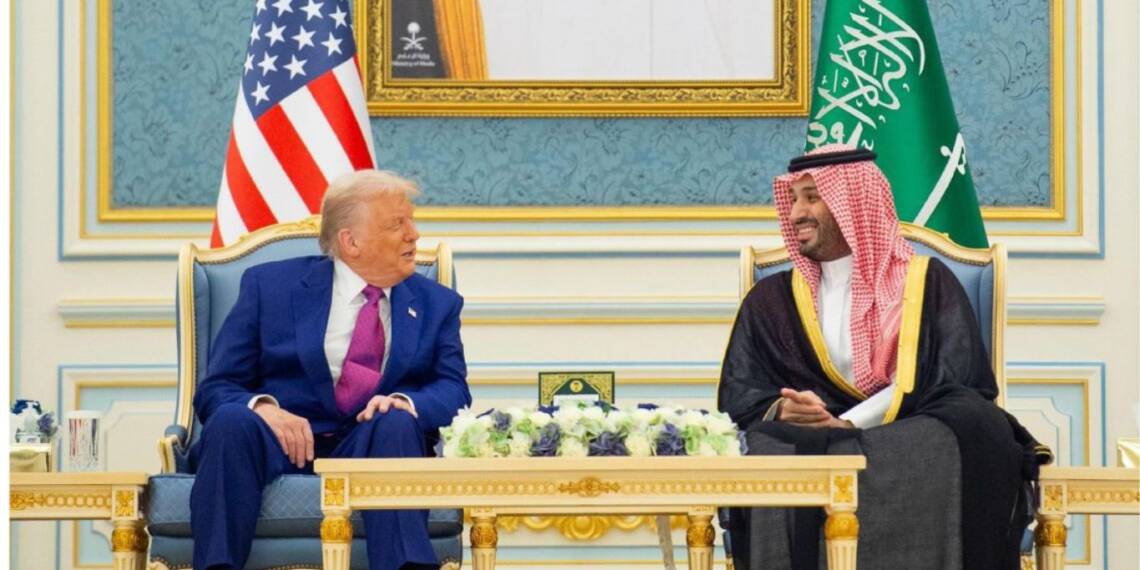On May 13, 2025, the United States signed a massive arms deal with Saudi Arabia worth nearly $142 billion, marking the largest defence cooperation agreement in U.S. history with the Kingdom. The deal was signed during U.S. President Donald Trump’s visit to Riyadh, the capital of Saudi Arabia. According to a White House fact sheet, the package includes deals with over a dozen American defense companies. These deals cover a wide range of sectors such as air and missile defense, space and air force development, maritime security, and military communications.
While the deal is being described as a major step in strengthening the U.S.-Saudi alliance, it did not mention whether Saudi Arabia will be allowed to buy F-35 stealth fighter jets made by Lockheed Martin. The F-35s are considered among the most advanced military aircraft in the world and are currently operated only by Israel in West Asia. The issue is sensitive due to the U.S. policy of maintaining Israel’s “qualitative military edge,“ meaning that Israel must always have the most advanced American military equipment in the region.
This arms package strengthens Saudi Arabia’s position as the biggest customer for U.S. arms. It also reflects that the Americans are not leaving West Asia, rather deepening ties with Gulf allies in the region amid rising tensions across West Asia.
Why Does Saudi Arabia Need Such a Large Arms Deal?
Saudi Arabia’s reasons for purchasing such a huge arsenal are both practical and political. Let’s decode the reason behind this large military package.
1. Regional Security Threats
Saudi Arabia faces multiple security challenges in its neighborhood. Its main rival is Iran, a regional power that supports armed groups in countries like Yemen, Lebanon, Iraq, and Syria. These groups often work against Saudi interests and threaten its borders and allies. Though the reconciliation happened in 2023 through Chinese mediation, the reason for the conflict is that the issue has not been addressed yet. The long-running conflict in Yemen, where Saudi forces are fighting Iran-backed Houthi rebels, demands continued use of air power, missile defence systems, and surveillance technologies.
In addition, Saudi Arabia’s economic lifeline—its oil exports—depends on safe sea routes through the Gulf and Red Sea. These waters are vulnerable to attacks and blockades, making maritime security a top concern.
2. Stability for Vision 2030
Crown Prince Mohammed bin Salman’s Vision 2030 is a long-term plan to modernize the Saudi economy and reduce its dependence on oil. However, for this vision to succeed, internal and external stability is essential. A strong and well-equipped military helps deter both domestic threats (such as protests or insurgency) and external aggression.
3. Diplomatic Leverage with the West
By buying weapons from the United States, Saudi Arabia ensures that these countries remain invested in its security and political future. Arms purchases are not just about defense—they are also diplomatic tools. Through large deals, Saudi Arabia strengthens its relationship with Washington, securing support in times of crisis.
4. Status and Leadership in the Arab World
Military power is also a symbol of status. Owning cutting-edge weapons like missile defense systems and fighter jets gives Saudi Arabia a sense of prestige and reinforces its leadership role among Arab and Sunni Muslim countries. It also helps the Kingdom compete with regional powers like the United Arab Emirates (UAE), Qatar, and Egypt, especially within organizations like the Arab League and the Organization of Islamic Cooperation (OIC).
At last, it can be said that the recent $142 billion U.S.-Saudi arms deal is more than just a business transaction. It reflects Saudi Arabia’s security needs and its desire to maintain regional influence. In a volatile West Asian region marked by rivalries, proxy wars, and shifting alliances, Riyadh sees advanced military capability as a key pillar of national strength. At the same time, by aligning closely with the United States, Saudi Arabia is trying to ensure both its defense and its diplomatic standing for the years ahead.








